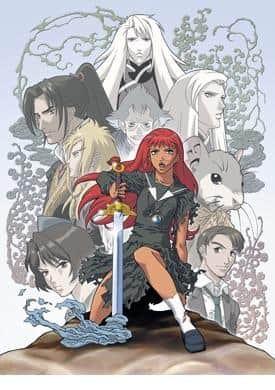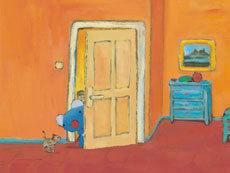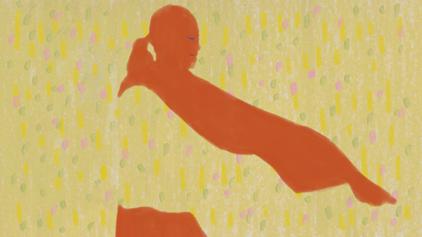The appeal and evaluation of "Twelve Kingdoms": To the depths of the fantasy world

"Twelve Kingdoms": The appeal and profound themes of fantasy set in another world"Twelve Kingdoms" is a TV anime series based on the original novel by Fuyumi Ono, and was broadcast on NHK BS-2 from 2002 to 2003. This work, which consists of 45 episodes, goes beyond the framework of fantasy set in another world and depicts human drama and social issues, deeply inspiring and provoking viewers. In this article, we will take a detailed look at the appeal of "Twelve Kingdoms" and the themes behind it, as well as provide detailed information about the work and recommended points. Story and worldviewThe story of "Twelve Kingdoms" begins when an ordinary high school girl, Nakajima Yoko, is brought to another world, "Twelve Kingdoms," by a mysterious young man named Keiki. The Twelve Kingdoms is a world with a unique system in which a sacred beast called a kirin selects a king who then rules the country. Yoko learns that Keiki is the kirin of Kei and that she has been chosen to be the king of Kei, and begins a new life while overcoming various difficulties. The world of the Twelve Kingdoms is extremely detailed, with each country having its own culture and customs, and the rule of the king determines whether the country prospers or declines. In addition, fantasy elements such as demons and half-beasts add depth to the story and draw the viewer in. Characters and castThe main character, Nakajima Yoko, is voiced by Hisakawa Aya, who portrays her growth and struggles realistically. Yoko's classmate Sugimoto Yuka is played by Ishizu Aya, and her childhood friend Asano Ikuya is played by Ueda Yuji. Don't miss the struggles and growth of these characters as they travel to the Twelve Kingdoms with Yoko. In particular, the performances of the cast supporting the unique characters, such as Suzumura Kenichi as Rakushun, Koyasu Takehito as Keiki, and Aizawa Masaki as Naotaka, are also superb. Important characters who support Yoko include Rakushun, Keiki, Naotaka, and Rokuta. Rakushun provides emotional support for Yoko, while Keiki guides her on her path as a king. Naotaka gives advice to Yoko as the king of the country of wild goose, and Rokuta adds color to the story as a mysterious boy who travels between the two worlds. The human drama woven by these characters is one of the attractions of "Twelve Kingdoms." Production and staffStudio Pierrot produced the animation for "Twelve Kingdoms," directed by Tsuneo Kobayashi. It has been praised for faithfully recreating the worldview of the original work while taking advantage of the expressive power of animation. Character design by Hiroto Tanaka and Yuko Kusumoto, and music by Kunihiko Yanagi, add to the atmosphere of the work. The opening theme "Twelve Fantasy Songs" was composed and arranged by Kunihiko Yanagi, and the ending theme "Moonlight Wind Shadow" was written by Keiko Kitagawa, composed and arranged by Tomohiko Kira, and sung by Mika Arisaka. These songs also deepen the worldview of the work and resonate with the hearts of viewers. Theme and Message"Twelve Kingdoms" depicts universal themes such as human relationships, social issues, and self-realization within the framework of an alternate world fantasy. In particular, Yoko's growth and acquisition of a sense of responsibility as a king provide viewers with an opportunity to think about their own meaning of existence and how they live their lives. Also, it is not to be missed that the problems faced by each of the twelve kingdoms and the relationship between the king and the people are used to symbolically depict the problems of modern society. For example, the discrimination against the half-beasts in the country of Takumi and the existence of Shuei, the false king of the country of Kei, depict the corruption of power and social injustice, encouraging viewers to have deep insights. In addition, Yoko's struggle with loneliness while overcoming difficulties with her friends teaches us the importance of friendship and trust. Recommended points"Twelve Kingdoms" is recommended not only for fantasy fans, but also for those who are interested in human drama and social issues. In particular, the following points are the reasons for recommending it.
Detailed episode information"Twelve Kingdoms" consists of 45 episodes, each with a different subtitle. Below are the subtitles for each episode.
Conclusion"Twelve Kingdoms" is a work that depicts profound themes, a detailed worldview, and realistic character growth that go beyond the framework of fantasy set in another world. It gives viewers an opportunity to think about the meaning of their existence and how they live their lives, and by symbolically depicting human drama and social issues, it gives deep emotion and insight. I would highly recommend this work not only to fantasy fans, but also to anyone interested in human drama and social issues. |
Recommend
Taro Yamashita of the Kaiku High School baseball team: Tracing the path of talent and hard work
"Yamashita Taro, a member of the Kaiku High ...
Stills of the TV series "Douluo Continent 2" with the full cast Li Xiaoran plays Bibi Dong
The TV series "Douluo Dalu 2" released ...
The latest stills and art pictures of the new theatrical version of the famous game "Alchemy for Whom" are still beautiful
The new animated theatrical version of "Alch...
Resident Evil film director to direct live-action adaptation of House of the Dead
Remember those "classic" Resident Evil ...
Cameron praised the Resident Evil 1 movie for rewatching it during the epidemic
Cameron revealed in a recent interview that the 2...
Review and impressions of "I Want to Become a Shadow Powerful Person! 2nd Season"
"I Want to Become a Shadow Power! 2nd Season...
The appeal and evaluation of Fushigi Yuugi -Eikoden-: A moving story and the depth of the characters
The appeal and evaluation of "Fushigi Yuugi ...
The final chapter of "Guardians of the Galaxy Vol. 3" will be released on May 5th, and a new trailer has been released
Today (April 13), Marvel released the latest trai...
Spider-Man Punk wasn't originally going to appear in Spider-Man: Beyond the Universe
Spider-Man: Into the Spider-Verse featured so man...
"The Reason She Went to the Duke's House": A thorough analysis of the fascinating story and character depth
The reason why she went to the duke's mansion...
The classic masterpiece "Yu Yu Hakusho" is about to start a new stage play, and many wonderful stills are released
Countless famous anime works from the island coun...
The famous romance manga "My Girlfriend Is More Than Cute" to be made into a TV animation
The love manga "My Girlfriend is More Than J...
The appeal and evaluation of "The Five Little Pigs and the Charleston": A deep look into the masterpiece of everyone's songs
The Five Little Pigs and the Charleston - Gohi Ki...
EVA town commemoration event: 7-meter-long exquisite cast iron Spear of Longinus unveiled
As part of the "Neon Genesis Evangelion"...
The appeal and reviews of "Free! -Eternal Summer- Extra Fr": A deep look into the special summer story
"Free! -Eternal Summer- Extra Fr": A st...









